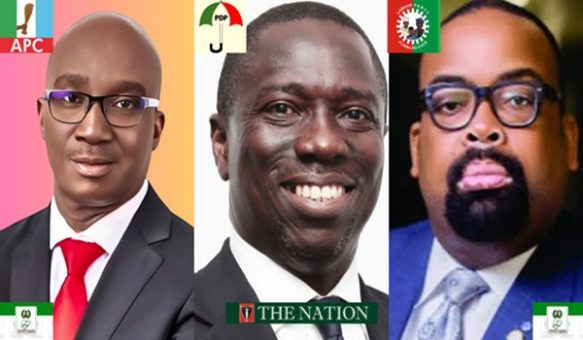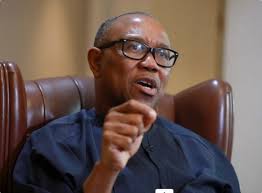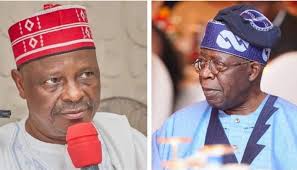
A jumbled succession strategy in Edo
The results of the governorship elections that were conducted in 18 local governments have caused a shift in power in Edo State.
Senator Monday Okpebholo of the All Progressives Congress (APC) defeated Dr. Asue Ighodalo of the Peoples Democratic Party (PDP). The implications of the collapsed succession plan for Governor Godwin Obaseki and his party are examined by Deputy Editor Emmanuel Oladesu.
Godwin Obaseki, the governor of Edo State, intended to install a successor. He genuinely put forth a lot of effort to attain his goal. However, the dream faded into daydreaming yesterday.
As the governorship race came to an end, the embattled president and his fellow travellers in the Peoples Democratic Party (PDP) were met with reality. For all their bluster, their labours had been in vain.
It's official: the election is won or lost. Three months from now, the head tenant of Osadebey House in Benin City will be Senator Monday Okpebholo of the All Progressives Congress (APC) rather than Dr. Asue Ighodalo of the PDP.
No condition is permanent, and power is ephemeral.
This marks a sea change for the state. After experiencing internal conflict inside the party six years after losing the election, APC has managed to recover.
It's instructive that the governor's effort to install his chosen candidate as governor was shelved by the same forces that propelled him to office eight years prior.
Analysts saw the poll's results as a vote on the Obaseki administration's performance. It was interpreted as supporting a change in power. In the state, it marked the end of an era.
The campaign was in full swing. No decision was ever left to chance by candidates or their godfathers, Adams Oshiomhole and Obaseki, on either side.
The populace flocked outside to greet the flagbearers during the campaigns. The weight was on the governor to explain his push for continuity of PDP government in Edo.
Apprently, Obaseki saw defeat coming. The handwriting was bold on the wall. Perhaps, he could not read it from afar. The political danger was looming, but he could not avert it. After he refused to sign the peace accord, he also cried foul, alleging plans by the APC to rig.
The power of incumbency had crumbled.
It was a keenly contested election. Both candidates, Okpebholo and Ighodalo from Edo Central District are eminently qualified to govern the state.
The only difference is that certain circumstances made the pendulum of victory to swing more towards APC’s direction. The lesson is that party leaders have to put their house in order, anticipate the intervening variables and work ahead to mitigate their effects on the ballot box.
It was obvious APC was better prepared, although it was not a walk over. As opposition leader, it was more focused and more united unlike PDP. Indeed, APC quickly ovecame the initial crisis unleashed by its rancorous primary.
Also, the party opted for genuine reconciliation as underscored by the equitable sharing formula. The Okpebholo/Idahosa ticket was the outcome of the truce. After that, the party started to work hard to displace the PDP.
However, the strength of Edo PDP only laid in its power of incumbency. As the ruling party, it had enough resources at its disposal to prosecute Obaseki’s succession plan. But there was disputation. Many chieftains who were aggrieved never believed that Ighodalo was a collecive candidate.
Why APC settled for a home-grown candidate, Okpebholo, who is a Edo Central senator, Ighodalo, to some PDP stalwarts, was imposed by the governor. The aggrieved PDP chieftains, led by Dan Orbih, distanced themselves from the succession projects. Reconciliation failed in the party.
Also, defections from PDP to APC meant that the defectors have, to some extent, split the votes. Only few ruling parties actually have the chance of winning, following a split, ahead of critical elections.
The APC governors of the two contiguous states of Ondo and Kogi lent their hands of support to the Edo APC chapter. Ondo State Governor Lucky Aiyedatiwa stormed the state to mobilise the voting population in Yoruba-speaking areas in the North District.
More importantly, his Kogi counterpart, Usman Ododo leaned on cultural affinity of a section of his Kogites to appeal to those communities sharing boundaries with his state to vote for APC. For example, Ododo stormed Etuno, capital of Akoko-Edo,to campaign. He elicited a promise from the people to vote for Okpebholo.
The mobilisation approach yielded political capital. Obaseki’s deputy, Godwin Omobayo, could not resist the APC arsenal.
In the North District made up of six local governments, APC won. It was trailed by PDP. The Labour Party (LP) which fielded Olumide Akpata, former president of the Nigeria Bar Association (NBA), was lost in the crowd.
APC won Egon, defying some people's projections. People have been grumbling about the lack of infrastructure. They had screamed that the state administration was ignoring the area.
There was a protest vote in Orhionmwon, where the populace disapproved of the manner the government acquired certain areas. Pastor Osagie Ize-Iyamu and Dr. Pius Odubu, two APC leaders who already had a beef with Obaseki, were hard at work.
PDP, however, checkmated APC in the Central District.
Out of the five local governments, Ighodalo won three, while the APC won two. It is implied that PDP is currently more popular in the district than APC, even though PDP is the senator representing the constituency at the moment.
The two councils controlled by the APC are Esan Central, which has its headquarters in Irua, and Esan West (with headquarters at Ekpoma). But the son of the soil, Ighodalo, won Uromi.
In the Edo election, zoning or rotation had an effect, especially in the Central District. The two parties zoned their tickets to the district in their wisdom. Zoning insensitivity on the part of LP led to the fielding of a Southern candidate to replace the zone's native Obaseki following his two eight-year terms.
As expected, the South District served as both the battlefield and the final arbiter. In addition to demonstrating true power in the North, APC gained ground in the South. Ovia, the birthplace of House of Representatives member and Okpebholo's running mate Dennis Idahosa, did not win.
However, it was in Oredo that the defectors—Senator Matthew Urhoghide, the APC Campaign Council's director general, and Ogbade Ihama—turned the tide.
In some sections of Yorubaland, particularly Benin, the traditional institution, despite its neutrality, has remained a powerful factor in political calculations.
What can be learnt from the poll? Despite being a good candidate, Ighodalo lost, according to observers. It was clear that Obaseki was not reelected.
Ighodalo served as Oshiomhole's special advisor on economic development for eight years. Obaseki served as the Special Adviser on Taxation at the time. After some contemplation, many believed that Oshiomhole ought to have appointed Asue to succeed him. Oshiomhole was informed that Obaseki's grandfather had supposedly betrayed Oba of Benin when he wanted Obaseki to succeed him. According to Oshiomhole, that was in the past. History is what's left.
In the financial industry, Asue is highly respected. HD is stable. Being appointed NBL, Iganmu Chairman is an amazing accomplishment. Assessing the field, he was the most qualified contender judging by his antecedents.
However, Obaseki had a large number of political adversaries. Together, they set out to oppose his candidate. Deputy Governor Phillip Shaibu, Orbih, and Abuja Minister Nyesom Wike collaborated with Oshiomhole against the PDP.
Additionally, the governor of Edo was the target of the Lagos boys, under the leadership of Governor Babajide Sanwo-Olu. After PDP trounced APC in Edo four years ago, Obaseki, who made it to Lagos, began making jokes about how Edo is not Lagos and that Asiwaju Bola Tinubu returned to Lagos empty-handed.
Anselem Ojezua's supporters, who led APC executives alongside Obaseki to the Legacy PDP while Oshiomhole was governor and was the former chairman of the APC, said that he and the group were later made redundant.
Even more irritated was Kabiru Adjoto, the PDP Speaker of the House of Assembly and candidate for Shaibu's deputy governorship.
Obaseki initiated combat on multiple fronts.
After the poll, what happens next? Both sides will do a post-mortem. In order to prevent poll workers from arriving at voting places late for upcoming elections, the Independent National Electoral Commission (INEC) will also examine and assess its current protocols.
For the benefit of upcoming polls, the election observers and monitors will submit their reports.
Following a thorough examination, those flagged by the Economic and Financial Crimes Commission (EFCC) for suspected vote-buying may face legal action.





